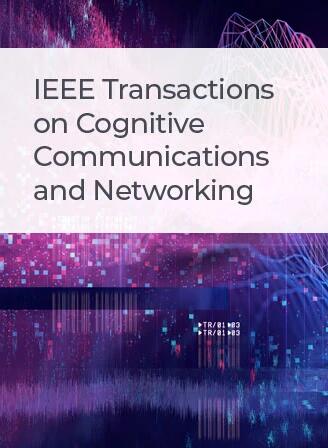Robust Energy Efficiency Optimization for Double-RIS-Assisted Wireless-Powered Backscatter Communications
IF 7.4
1区 计算机科学
Q1 TELECOMMUNICATIONS
IEEE Transactions on Cognitive Communications and Networking
Pub Date : 2024-08-05
DOI:10.1109/TCCN.2024.3438354
引用次数: 0
Abstract
To explore the potential of multiple collaborative reconfigurable intelligent surfaces (RISs) for wireless-powered backscatter communications (WP-BackCom), in this paper, we investigate a robust energy efficiency (EE) optimization problem for a double-RIS-assisted WP-BackCom system, where a power station (PS) transmits wireless energy signals to multiple backscatter devices (BDs) via one RIS during the energy-harvesting phase, and then all BDs use the harvested energy for active transmission via another RIS. The total EE of all BDs with bounded channel uncertainties is maximized by jointly optimizing the beamforming vectors of the PS and RISs, transmission power, reflection coefficients, and time allocation factors. To solve the challenging problem, an iterative robust resource allocation algorithm is designed by employing the alteration optimization approach, the worst-case approach, the penalty function method, and the Gaussian randomization method. Simulation results verify that the proposed algorithm has strong robustness and higher EE.双 RIS 辅助无线供电反向散射通信的稳健能效优化
为了探索多个协作式可重构智能表面(RIS)在无线供电反向散射通信(WP-BackCom)中的应用潜力,本文研究了双RIS辅助WP-BackCom系统的稳健能效(EE)优化问题,在该系统中,发电站(PS)在能量收集阶段通过一个RIS向多个反向散射设备(BD)传输无线能量信号,然后所有BD通过另一个RIS将收集到的能量用于主动传输。通过联合优化 PS 和 RIS 的波束成形向量、传输功率、反射系数和时间分配系数,可在信道不确定性受限的情况下实现所有 BD 的总 EE 最大化。为了解决这个具有挑战性的问题,设计了一种迭代稳健资源分配算法,采用了改变优化法、最坏情况法、惩罚函数法和高斯随机化法。仿真结果验证了所提出的算法具有很强的鲁棒性和更高的 EE。
本文章由计算机程序翻译,如有差异,请以英文原文为准。
求助全文
约1分钟内获得全文
求助全文
来源期刊

IEEE Transactions on Cognitive Communications and Networking
Computer Science-Artificial Intelligence
CiteScore
15.50
自引率
7.00%
发文量
108
期刊介绍:
The IEEE Transactions on Cognitive Communications and Networking (TCCN) aims to publish high-quality manuscripts that push the boundaries of cognitive communications and networking research. Cognitive, in this context, refers to the application of perception, learning, reasoning, memory, and adaptive approaches in communication system design. The transactions welcome submissions that explore various aspects of cognitive communications and networks, focusing on innovative and holistic approaches to complex system design. Key topics covered include architecture, protocols, cross-layer design, and cognition cycle design for cognitive networks. Additionally, research on machine learning, artificial intelligence, end-to-end and distributed intelligence, software-defined networking, cognitive radios, spectrum sharing, and security and privacy issues in cognitive networks are of interest. The publication also encourages papers addressing novel services and applications enabled by these cognitive concepts.
 求助内容:
求助内容: 应助结果提醒方式:
应助结果提醒方式:


